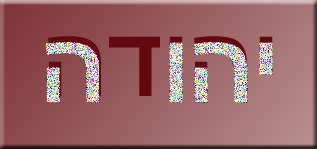
The following paragraph is from Dr. Asher Eder’s book The Star of David, which was published in 1987 in English in Jerusalem by Rubin Mass Ltd. The publication here is courtesy of Oren Mass
This version includes corrections and new materials that do not appear on the printed version
Daleth, ד , means door. It is any door's function to allow passage or to block it. If one wants to enter a house or move from one room to another, one has to pass through a door. This simple truth also holds when considering Man's way from the "natural, earthly Adam" to the "spiritual Adam" (see above, chapters 7 & 8).
Abram-Abraham followed the Divine call to leave Babel. He opened the door into God's Kingdom. This opening of the door meant for him and his seed after him a one-way passage, and a simultaneous closing of that door to prevent a return to Babel It is for this passing that he was called a Hebrew which means literally "one who passed, or crossed", i.e. who crossed from the world of Babel into the true world of the spirit of God. Abraham, being a physical descendant of 'Eber', by this act of passing became his spiritual son as well, worthy of that name (‘Eber = Hebrew, in English).
Abraham's role, after the split of David's kingdom and the disappearance of the Northern Kingdom of Israel, is being carried on by the tribe of Yehudah (Juda, in English transcript). This name is formed by inserting ד, daleth, the fourth sign of the Hebrew Aleph-Beth, into the tetragrammaton, the Name of the Lord. That means to say that the name of this tribe, Yehudah, already indicates its task of "opening a door" into God's kingdom, and uniting the four worlds, under His sovereignty.
However, all this traces back to Abraham. With him begins the history of Israel which is to lead into the Divine Kingdom, the latter being symbolized by the fifth sign of the Hebrew Aleph-Beth, i.e ,ה heh.
The insertion of this sign into his original name Avram and converting it to Avraham (Abraham in English transcript) points to that mission of his.
Dr. Eder's notes:
A man who does not harken to the call unto his freedom, is symbolically brought to the door, and his ear is bored, Exod. 21:5,6. Significantly enough, the rule to free slaves tops the list of commandments right after the Decalogue.
'Eber, in Gen.10:24, 11:14-16, is the English transcript for the Hebrew word 'ever, which means Hebrew, i.e. one who crossed from the world of confusion to the Divine Kingdom of Truth. The crossing of the Jordan River from the lands of Babel expresses this geographically. 'Eber is the prototype of the Hebrews, this term being confined to the line of Abraham-Isaac-Jacob and their descendants who are known as the Semites. Cf. Exod.7:10, Num.6:27, Deut.28:10.
The English spelling for the word Yehudah is Judah or Jew. Yehudah means literally "he will confess, or thank, God if even only by his very being."
The letter u in the English spelling Yehudah derives from the Hebrew sign wav, which can be rendered by o, u, or v, depending on its position in a word.
We may say that Yehudah is God's answer to Nimrod's Babel.
The "Four Worlds" of Emanation, Creation, Formation and Making, are expressed in the "Kabbalistic Tree"; see Adam and the Kabbalistic Tree, by Z'ev ben Shimon Halevi, p.28.
The role of the sign ה , heh, and what it symbolizes, is indicated by its insertion into the name אברם , Abram, thus forming אברהם , Abraham , Gen.17:5). There are scholars who trace its importance back to the term בהבראם , bi'hibaram of Gen.2:4: "when they [i.e. Heavens and Earth] were created." This Hebrew term allows the interpretation "in (or with) ה , heh, created He them." Moreover, the term הבראם contains the same signs by which the name ,אברהם Abraham, is composed, suggesting that with it, or with Abraham, will the Lord make (עשה) Earth and Heavens. Some scholars find this idea emphasized in the Torah by the writing of the sign ה there at half its normal size. This small format may tell us about the small beginning, the Divine idea, which then takes shape in, or with, Abraham, expanding into Israel, and finally reaching out to Mankind. Thus ה, heh, may be seen as a symbol for the Divine Kingdom.
No comments:
Post a Comment
Note: Only a member of this blog may post a comment.